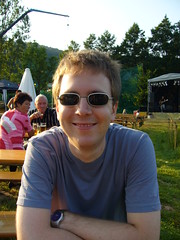Sehr oft ist die Menge echter "science" in Science Fiction eher gering. Da wird überlichtschnell gereist, wenns sein muss auch in die Zukunft oder Vergangenheit. Große Raumschlachten mit Explosionen und Schreien. Die Wissenschaft bleibt zugunsten der Story auf der Strecke. Und während manche Leute sogar der Meinung sind, gute Science Fiction braucht schlechte Science, hat Mike Brotherton für seine Anthologie "Diamonds in the Sky" genau das Gegenteil versucht: SF-Kurzgeschichten zusammenzustellen, die astronomische Zusammenhänge möglichst korrekt wiedergeben. Und zwar so korrekt, dass sein Projekt von der National Science Foundation gefördert wurde, und die Kurzgeschichten für Schüler und Studenten als Lernhilfe dienen sollen!
Sehr schön finde ich, dass in der Anthologie beide Seiten zu Wort kommen - ausgezeichnete Science Fiction-Autoren wie Jeffrey Carver, David Levine oder Mary Robinette Kowal, aber eben auch Wissenschaftler wie Kevin R. Grazier (beteiligt an der Cassini/Huygens Mission), oder Valentin Ivanov (Mitarbeiter des ESO).
Alle Kurzgeschichten sind übrigens frei zugänglich über die Read-Links unten. Viel Spaß beim Lesen!
Contents
In the Autumn of Empire (Jerry Oltion)
A cautionary tale about why scientific misconceptions can be important. This story will also be appearing in Analog soon. Keywords: The seasons. Misconceptions.
ReadEnd of the World (Alma Alexander)
Nothing is forever, not even the earth and sky. Keywords: Evolution of the sun.
ReadThe Freshmen Hookup (Wil McCarthy)
An exploration of how the elements are built in stars using the antics of college freshmen as a metaphor. Keywords: Stellar nucleosynthesis.
ReadGalactic Stress (David Levine)
You think your life is stressful? How about having to deal with the entire universe? Keywords: Scales of the Universe.
ReadThe Moon is a Harsh Pig (Jerry Weinberg)
Robert Heinlein’s novel The Moon is a Harsh Mistress about a revolt on the Moon was a landmark novel of the 1960s. Jerry’s story is also educational. Keywords: Phases of the Moon, Misconceptions.
ReadThe Point (Mike Brotherton)
What is the meaning of life in an expanding universe? This story previously appeared at www.mikebrotherton.com. Keywords: Cosmology
ReadSquish (Dan Hoyt)
How would you like a whirlwind tour of the planets? Keywords: The Solar System.
ReadJaiden’s Weaver (Mary Robinette Kowal)
So many things about life on Earth depend on the cycles of the sky, from the moon and tides to seasons and more. Well, what if the sky were different? How would humans adapt to life on a world with rings? Keywords: Planetary rings
ReadHow I Saved the World (Valentin Ivanov)
The movies Armageddon and Deep Impact featured nuclear bombs to divert asteroids headed for Earth, but this is really not the best way to deal with this threat. This story was originally published in Bulgaria, in the annual almanac “Fantastika”, the 2007 issue. Publisher: “Human Library Foundation”, Sofia. ISSN 1313-3632. Editors: Atanas P. Slavov and Kalin Nenov. Keywords: Killer asteroids
ReadDog Star (Jeffrey A. Carver)
It permeates space and has a subtle but important effect on our existence. What if the effect were not so subtle? Keywords: Dark Energy
ReadThe Touch (G. David Nordley)
Life in the Milky Way can be harsh depending the neighborhood you live in. You should hope you have helpful neighbors when the times are harsh. This story originally appeared in The Age of Reason, edited by Kurt Roth, at SFF.net in 1999. Keywords: Supernova (type 1a)
ReadPlanet Killer (Kevin Grazier and Ges Seger)
And sometimes the times are harsh but you have to depend on yourselves. It helps if you have a little unlikely but useful faster-than-light starships as in Star Trek. Keywords: That would be telling!
ReadThe Listening-Glass (Alexis Glynn Latner)
What’s the future hold for astronomy and astronomers? What would it be like to work on the moon? An earlier version of the story was first published in the February, 1991 issue of Analog Science Fiction/Science Fact. Keywords: Radio astronomy, the Moon
ReadApproaching Perimelasma (Geoffrey A. Landis)
A sophisticated tale about the ultimate journey. Previously published in Asimov’s Science Fiction, Jan. 1998. Keywords: Black holes
Read






Keine Kommentare:
Kommentar veröffentlichen